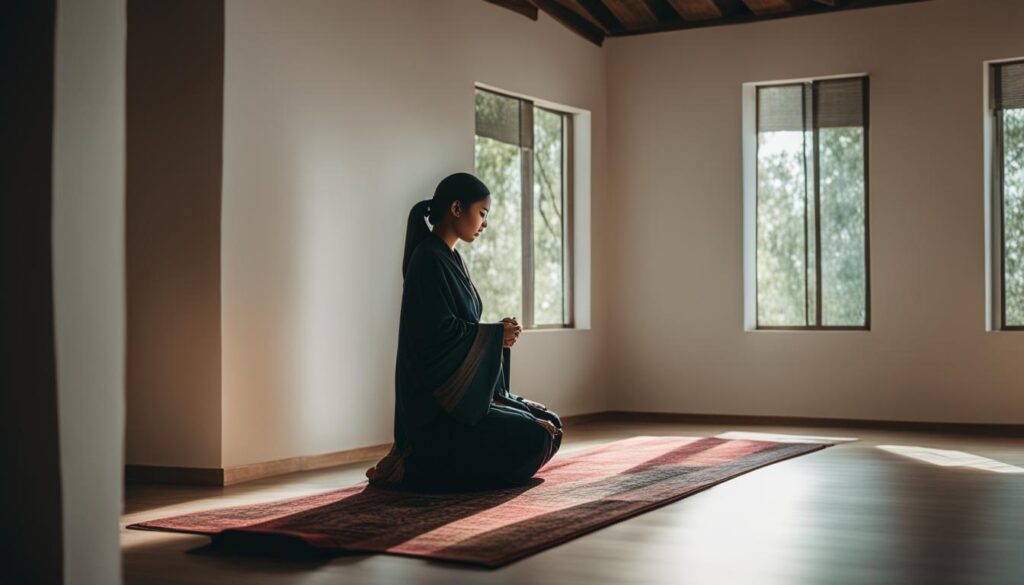Muslim prayer traditions, also known as Islamic prayer rituals, are an integral part of the Islamic faith. Muslims are required to pray at five set times throughout the day, including Fajr (dawn), Dhuhr (midday), Asr (afternoon), Maghrib (sunset), and Isha (night). Prayer serves as a connection to God and unites Muslims around the world through physical movements and recitation of verses from the Quran. Praying directly to God without the need for an intermediary is encouraged, and cleanliness is important, with Muslims performing ablution before prayer to purify themselves. By understanding Muslim prayer practices, we can gain insight into the spiritual significance and daily rhythm of the Muslim community.
Key Takeaways:
- Muslim prayer traditions involve praying five times a day at specific times.
- Prayer serves as a means of connecting with God and unifying Muslims globally.
- Cleanliness is important, with Muslims performing ablution before prayer.
- Praying directly to God without an intermediary is encouraged.
- Prayer sets the rhythm of the day and helps maintain a spiritual connection with the Creator.
The Universal Practice of Prayer in Islam
Prayer is a universal practice among Muslims, with billions of people around the world engaging in this spiritual act. It is not just a mere recitation of words, but a way to unify mind, soul, and body in worship. Muslims put aside worldly cares and thoughts before praying to focus exclusively on God. The act of prayer connects Muslims to one another and to those who have practiced the same rituals throughout Islamic history. Muslims pray directly to God and believe that prayer not only fulfills a religious duty, but also provides personal benefits and spiritual growth.
“Prayer is when I connect with my Creator and find peace amidst the chaos of life. It’s a time when I can let go of my worries and seek guidance and comfort from God.” – A Muslim believer
Prayer serves as a reminder of the ultimate purpose of life and the importance of seeking a deeper connection with the divine. Muslims view prayer as a way to express gratitude, seek forgiveness, and find solace in times of hardship. It is a habit deeply ingrained in the daily lives of Muslims, offering a sense of structure, mindfulness, and discipline. By devoting themselves to prayer, Muslims aim to align their intentions, thoughts, and actions with the teachings of Islam.
The Power of Prayer in Islam
Prayer holds immense significance in Islam, as it is viewed as a direct channel of communication between the individual and God. It is considered a spiritual journey that brings believers closer to their Creator and strengthens their faith. Through prayer, Muslims seek guidance, seek blessings, and seek protection from hardships. The act of physically prostrating oneself in prayer symbolizes humility and surrender to God’s will.
Moreover, prayer offers a sense of unity among Muslims, regardless of their cultural or geographical differences. It transcends borders and creates a collective bond that connects Muslims from diverse backgrounds. The Muslim community often prays together in mosques, fostering a sense of communal worship and shared spiritual experiences. This unity is a reflection of the global Muslim ummah, an interconnected community of believers.
| Benefits of Prayer in Islam | Importance of Prayer in Islam |
|---|---|
|
|
Prayer in Islam is a deeply personal and profound experience, encompassing both physical actions and spiritual contemplation. It serves as a daily reminder of the believer’s relationship with God and their commitment to living a righteous life. By engaging in the universal practice of prayer, Muslims strive to cultivate a deep connection with their Creator and seek spiritual fulfillment in their journey of faith.
The Five Daily Prayers: A Guiding Rhythm
The five daily prayers prescribed in Islam serve as a guiding rhythm for Muslims’ daily lives. These prayers create a pattern for their day and help to maintain a sense of mindfulness and gratitude. The prayer timetable, which varies based on the position of the sun, ensures that Muslims have dedicated times throughout the day to reconnect with God. The specific prayers include Fajr (before sunrise), Dhuhr (midday), Asr (afternoon), Maghrib (just after sunset), and Isha (late evening). Each prayer has a designated number of rakats, or movements, that accompany the recitation of specific verses from the Quran.
| Prayer Name | Time | Rakats |
|---|---|---|
| Fajr | Before sunrise | 2 |
| Dhuhr | Midday | 4 |
| Asr | Afternoon | 4 |
| Maghrib | Just after sunset | 3 |
| Isha | Late evening | 4 |
Throughout the day, Muslims align their activities with these prayer times, creating a rhythm that allows them to pause, reflect, and connect with their spirituality. While the number of rakats may vary depending on the prayer, each rakat consists of specific physical motions, including standing, bowing, prostrating, and sitting. These movements are accompanied by the recitation of verses from the Quran, allowing Muslims to engage both their bodies and minds in worship.
“The five daily prayers provide a structure and rhythm to my day. They serve as reminders to prioritize my spiritual well-being and maintain a connection with Allah throughout my busy schedule.” – Muslim practitioner
The rhythm of the five daily prayers extends beyond the physical acts of prayer. It also serves as a reminder for Muslims to align their intentions and actions with their faith throughout the day. By pausing to pray at designated times, Muslims are encouraged to cultivate gratitude, seek forgiveness, and renew their commitment to living a righteous life. The guiding rhythm of the five daily prayers helps Muslims maintain a balanced and purposeful lifestyle, ensuring that their spirituality remains a central focus amid their daily responsibilities.

The Importance of the Muslim Prayer Timetable
The Muslim prayer timetable plays a crucial role in ensuring that Muslims are able to fulfill their daily prayer obligations. As the position of the sun changes throughout the day, it indicates the start and end times for each prayer. This timetable allows Muslims to plan their activities and allocate time for prayer, ensuring that they never miss an opportunity to connect with their Creator.
- The Muslim prayer timetable serves as a practical tool for Muslims to stay organized and committed to their daily worship. It provides a clear schedule, helping them to structure their day around the five prayers.
- Additionally, the prayer timetable fosters a sense of unity among Muslims worldwide. Regardless of geographical location, Muslims are able to synchronize their prayers, knowing that they are engaging in the same acts of worship as their fellow believers.
- The act of adhering to the prayer timetable also instills discipline and mindfulness in Muslims’ lives. It serves as a constant reminder of their spiritual duties, encouraging them to prioritize their relationship with Allah above all else.
In conclusion, the five daily prayers in Islam provide a guiding rhythm for Muslims’ lives. Through the prayer timetable and specific prayer movements, Muslims are able to maintain a sense of mindfulness, gratitude, and spiritual connection throughout their day. These prayers serve as opportunities for reflection, seeking forgiveness, and renewing one’s commitment to living a righteous life. The prayer timetable ensures that Muslims never miss an opportunity to engage in this vital practice and helps foster unity among believers around the world.
Praying in Different Contexts
While Muslims are encouraged to pray in congregation and mosques, they can pray anywhere as long as it is clean. Praying in congregation helps Muslims realize their shared humanity and equality in the sight of God. However, if a mosque is not accessible, Muslims can pray individually in spaces such as their workplaces or educational institutions. The act of prayer transcends physical boundaries and serves as a means of spiritual connection. The role of the imam, the prayer leader in the mosque, is not that of a priest but rather a knowledgeable individual in Islam.
Praying in a mosque holds special significance for Muslims. It provides a dedicated space for communal prayer, fostering a sense of unity and belonging within the Muslim community. The mosque serves as a center for religious and social activities, where Muslims can come together to worship, seek knowledge, and engage in acts of charity. Mosques also often offer additional services, such as Islamic education classes, counseling, and community outreach programs. Attending congregational prayers in a mosque not only strengthens one’s personal connection with God but also fosters bonds of brotherhood and sisterhood with fellow Muslims.
When praying in congregation, Muslims follow the lead of the imam, who stands at the front of the prayer row. The imam’s role is to recite the verses from the Quran aloud and lead the congregation in the physical movements of prayer. Praying collectively enhances the spiritual experience, as Muslims come together to worship as a unified body. It is a time for reflection, humility, and seeking guidance from God. Praying in a mosque not only offers a space for individual spiritual growth but also reinforces the values of community, compassion, and unity that lie at the heart of Islam.
Benefits of Praying in Congregation
- Enhances a sense of community and unity
- Creates a supportive environment for spiritual growth
- Provides an opportunity for learning and guidance
- Promotes brotherhood and sisterhood among Muslims
- Strengthens one’s connection with God
Praying in Different Contexts
| Location | Considerations |
|---|---|
| Mosque | Provides a dedicated space for communal prayer, fosters a sense of unity, offers additional services. |
| Workplace | Pray individually in a clean and private space if a mosque is not accessible. |
| Educational Institution | Designated prayer areas may be available for students to pray individually. |
| Public Spaces | Find a quiet and clean area to pray individually, respecting the surroundings. |
Regardless of the context, Muslims strive to find ways to fulfill their religious duties while balancing their daily responsibilities. Praying in different settings allows Muslims to maintain their spiritual connection with God and live out their faith in a diverse range of environments. It is a testament to the flexibility and adaptability of the Islamic faith, which emphasizes the importance of prayer and worship in all aspects of life.
Accommodating Prayer in Daily Life
Muslims strive to fulfill their religious obligations while balancing their daily responsibilities, which includes finding ways to accommodate prayer in various contexts such as workplaces and educational institutions. To create a suitable environment for prayer, Muslims require a clean space free from impurities and with enough room to perform the physical movements required in prayer.
Some workplaces and educational institutions understand the importance of religious freedom and offer designated prayer spaces for their Muslim employees and students. These dedicated areas provide a peaceful and clean environment where Muslims can engage in their daily prayers. It allows them to fulfill their religious duties while maintaining their productivity and focus in their work or studies.
Providing prayer accommodations is not only about religious inclusion, but it also promotes diversity and respects the rights of individuals to practice their faith. It is a way to foster a sense of belonging and understanding among employees and students from different cultural backgrounds.
Employers and institutions are legally obligated to reasonably accommodate religious practices, including prayer, as long as it does not cause undue hardship. This means that organizations should make reasonable efforts to provide appropriate space and time for prayer, without imposing significant burdens on other employees or disrupting the normal functioning of the workplace or school.
| Benefits of Accommodating Prayer | Challenges of Accommodating Prayer |
|---|---|
|
|
Accommodating prayer in daily life is not only about meeting the religious needs of Muslims but also about fostering an environment of respect, inclusivity, and understanding. It allows individuals to practice their faith without compromising their professional or educational responsibilities.

Conclusion
Muslim prayer traditions hold immense significance in the lives of Muslims worldwide. These traditions, deeply rooted in the Islamic faith, provide a rhythm and structure to their daily routines. Through prayer, Muslims establish a profound connection with God, finding solace, guidance, and spiritual rejuvenation.
Prayer is not a mere physical act but a spiritual practice that encompasses the purification of the heart and the concentration of the mind. It is through prayer that Muslims strengthen their relationship with their Creator, finding inner peace and tranquility.
Understanding and respecting these Islamic prayer rituals is crucial in fostering inclusivity and religious freedom. Whether praying individually or in congregation, Muslims find a sense of belonging and unity through the shared experience of prayer. Creating accommodations for prayer in various contexts, such as workplaces and educational institutions, allows Muslims to fully engage in their daily lives while fulfilling their religious obligations.
By appreciating and acknowledging the importance of Muslim prayer traditions, we can promote a more inclusive society that values diversity and religious practices. Let us strive to understand and support one another, cultivating an environment where everyone can freely practice their faith.
FAQ
What are the different times for Muslim prayer?
The five set times for Muslim prayer are Fajr (dawn), Dhuhr (midday), Asr (afternoon), Maghrib (sunset), and Isha (night).
How do Muslims pray?
Muslims engage in physical movements and recite verses from the Quran during prayer. They pray directly to God without the need for an intermediary.
Is it necessary to pray in congregation?
While it is encouraged to pray in congregation, Muslims can pray individually as well. The act of congregational prayer helps Muslims realize their shared humanity and equality in the sight of God.
Where can Muslims pray?
Muslims can pray anywhere that is clean and free from impurities. While mosques are ideal for congregational prayer, individuals can pray in private spaces such as workplaces or educational institutions.
Are accommodations available for Muslim prayer?
Some workplaces and educational institutions offer designated prayer spaces to accommodate their Muslim employees and students. Employers and institutions are legally obligated to reasonably accommodate religious practices, including prayer.
How does prayer benefit Muslims?
Prayer not only fulfills a religious duty for Muslims but also provides personal benefits and spiritual growth. It helps Muslims maintain a spiritual connection with their Creator and serves as a way to focus their minds and purify their hearts.








